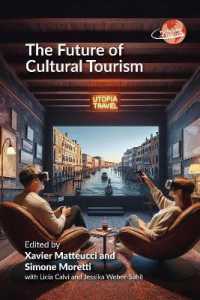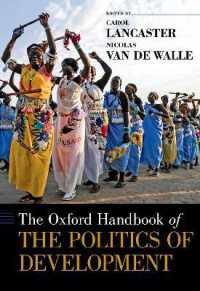- ホーム
- > 洋書
- > 英文書
- > Philosophy
基本説明
New in paperback. Hardcover was published in 2006. E. J. Lowe, a prominent figure in contemporary metaphysics, sets out and defends his theory of what there is. His four-category ontology is a metaphysical system which recognizes four fundamental categories of beings: substantial and non-substantial particulars and substantial and non-substantial universals. Lowe argues that this system has an explanatory power which is unrivalled by more parsimonious theories and that this counts decisively in its favour.
Full Description
E. J. Lowe sets out and defends his theory of what there is. His four-category ontology is a metaphysical system that recognizes two fundamental categorial distinctions which cut across each other to generate four fundamental ontological categories. The distinctions are between the particular and the universal and between the substantial and the non-substantial. The four categories thus generated are substantial particulars, non-substantial particulars, substantial universals and non-substantial universals. Non-substantial universals include properties and relations, conceived as universals. Non-substantial particulars include property-instances and relation-instances, otherwise known as non-relational and relational tropes or modes. Substantial particulars include propertied individuals, the paradigm examples of which are persisting, concrete objects. Substantial universals are otherwise known as substantial kinds and include as paradigm examples natural kinds of persisting objects.
This ontology has a lengthy pedigree, many commentators attributing it to Aristotle on the basis of certain passages in his apparently early work, the Categories. At various times during the history of Western philosophy, it has been revived or rediscovered, but it has never found universal favour, perhaps on account of its apparent lack of parsimony as well as its commitment to universals. In pursuit of ontological economy, metaphysicians have generally preferred to recognize fewer than four fundamental ontological categories. However, Occam's razor stipulates only that we should not multiply entities beyond necessity; Lowe argues that the four-category ontology has an explanatory power unrivalled by more parsimonious systems, and that this counts decisively in its favour. He shows that it provides a powerful explanatory framework for a unified account of causation, dispositions, natural laws, natural necessity and many other related matters, such as the semantics of counterfactual conditionals and the character of the truthmaking relation. As such, it constitutes a thoroughgoing metaphysical foundation for natural science.
Contents
I. METAPHYSICS, ONTOLOGY, AND LOGIC ; II. OBJECTS AND PROPERTIES ; III. METAPHYSICS AND NATURAL SCIENCE ; IV. TRUTH, TRUTHMAKING, AND METAPHYSICAL REALISM








